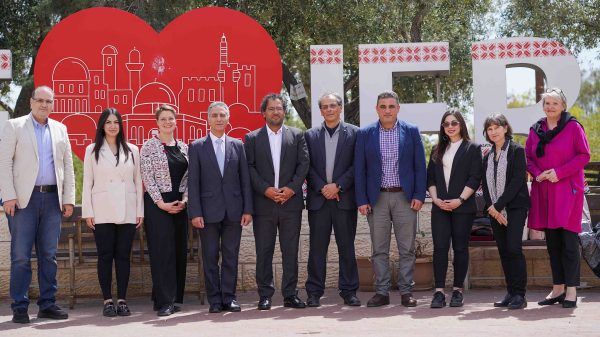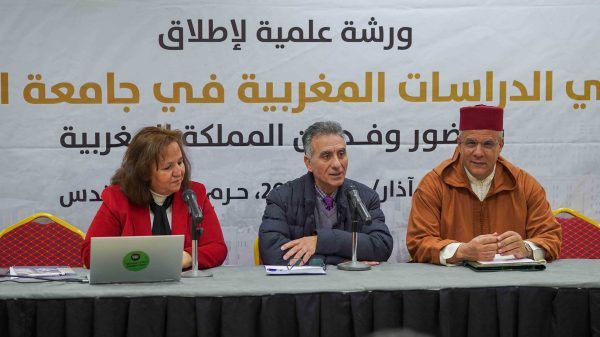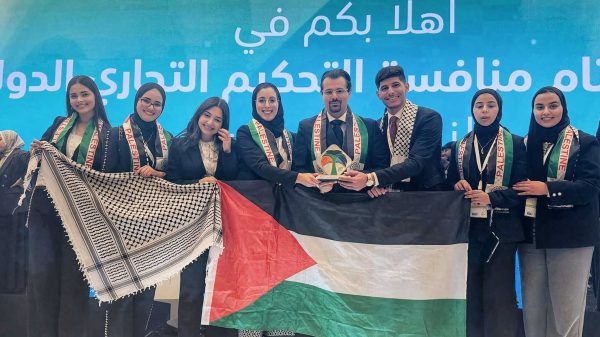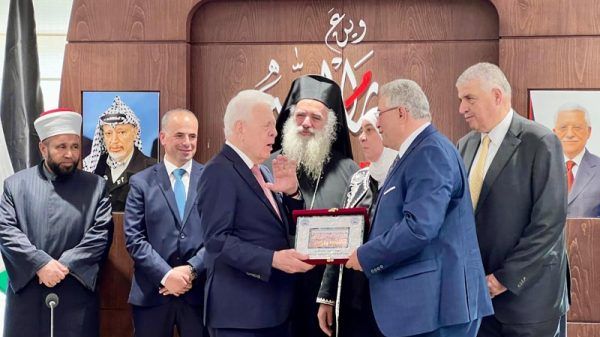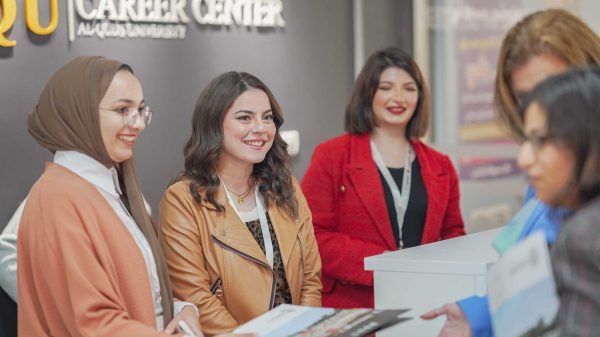 Between 16 and 20 March, the debating team of Jerusalem’s Al-Quds University was at the forefront of the 5th International Universities’ Debating Championship held in Qatar. The team, made up of five Palestinian students studying at the university – Dalia Alayassa, Yasmin Arda, Ahmad Toukan, Amani Ahmad and their coach Rania Al-Muhatadi – not only finished as top Palestinian university but also won the competition overall.
Between 16 and 20 March, the debating team of Jerusalem’s Al-Quds University was at the forefront of the 5th International Universities’ Debating Championship held in Qatar. The team, made up of five Palestinian students studying at the university – Dalia Alayassa, Yasmin Arda, Ahmad Toukan, Amani Ahmad and their coach Rania Al-Muhatadi – not only finished as top Palestinian university but also won the competition overall.
The rigorous annual competition, with 107 teams from 51 countries this year, includes participants from both Arabic and non-Arabic speaking countries. One of its aims is to promote Arabic as a language of innovation, as well as to provide young Arabic-speaking adults and students with opportunities to engage with participants from other cultures and backgrounds in a meaningful way by fostering their critical thinking, listening and debating skills.
According to Dalia Alayassa, the debating clubs in Palestinian universities are hugely important. “They bring students together and create an amazing sense of sisterhood and brotherhood,” she explained. “This is especially apparent given that in the majority of universities in Palestine most of the students focus more on their academic life than their social life.” The clubs, she added, teach students a myriad of other skills. “For example, they teach you how to organise events, how to raise funds and how to plan budgets, so that you may gain many other life skills apart from debating and public speaking.”
Despite all of the benefits of their debating activities, life for Palestinian students remains difficult. Those in occupied Jerusalem and the West Bank have to negotiate military checkpoints just to get to university and back home again on a daily basis. Throughout all of their training sessions, there was also an ever-present threat of Israeli forces invading the university grounds, as they have done, it is reported, on at least two occasions this semester.
Despite such obstacles, Al-Quds University student debating team were not only successful in Qatar but also went to compete against other students in Barcelona last week. The opportunity to learn debating skills, Alayassa said, is going to change Palestinian culture, with a huge effect on the way Palestinian students and professionals conduct themselves both locally and internationally. “Since debating is new to Palestine it starts on the micro-level,” she explained, “and affects individuals who start debating and then it affects their surroundings, and then the circles of people thus affected start getting bigger and bigger.” She cited her personal experience by way of example, noting that she saw her future, possibilities and dreams change for the better after starting to debate at the age of sixteen.
Many Palestinian students move on from debating to become volunteer coaches and judges in debating tournaments. “Once your mind and the way you think is changed,” said Alayassa, “you start working to try and change others, so you’re definitely going to change the culture into accepting more positive and new ideas over time.” She has now set up her own debate coaching programme for young female Palestinian students, touring universities with the aim of empowering women of the new generation by teaching them debating skills.
Not only does this have an impact within Palestine, but it also has a significant impact on how Palestinian students are viewed abroad, particularly through their tournaments in Europe. Another member of Al-Quds University debating team, Yasmin Arda, believes that their victory in Qatar is “very important” for all Palestinians. “It has lifted Palestine’s name up to tell the world that we Palestinians do exist and, yes, we have brains and we have people who are capable of doing things.”
The past few years have witnessed the potential for a future Palestinian state being trampled on by the expansionist policies of the Israeli government under Benjamin Netanyahu and its ongoing building and growth of illegal Jewish settlements in the occupied West Bank, as well as US President Donald Trump’s recognition of Jerusalem as the “undivided” capital of Israel. While the political situation remains troublesome for the people of Palestine as a whole, the education of a new generation of Palestinian students is continuing, including the rising culture of debate within their universities. When coupled with the international recognition that they are gaining from this, the signs are positive for the political and diplomatic potential of any future independent Palestinian state.
Published by Middle East Monitor, on April 15, 2019.
Available via the link below:



